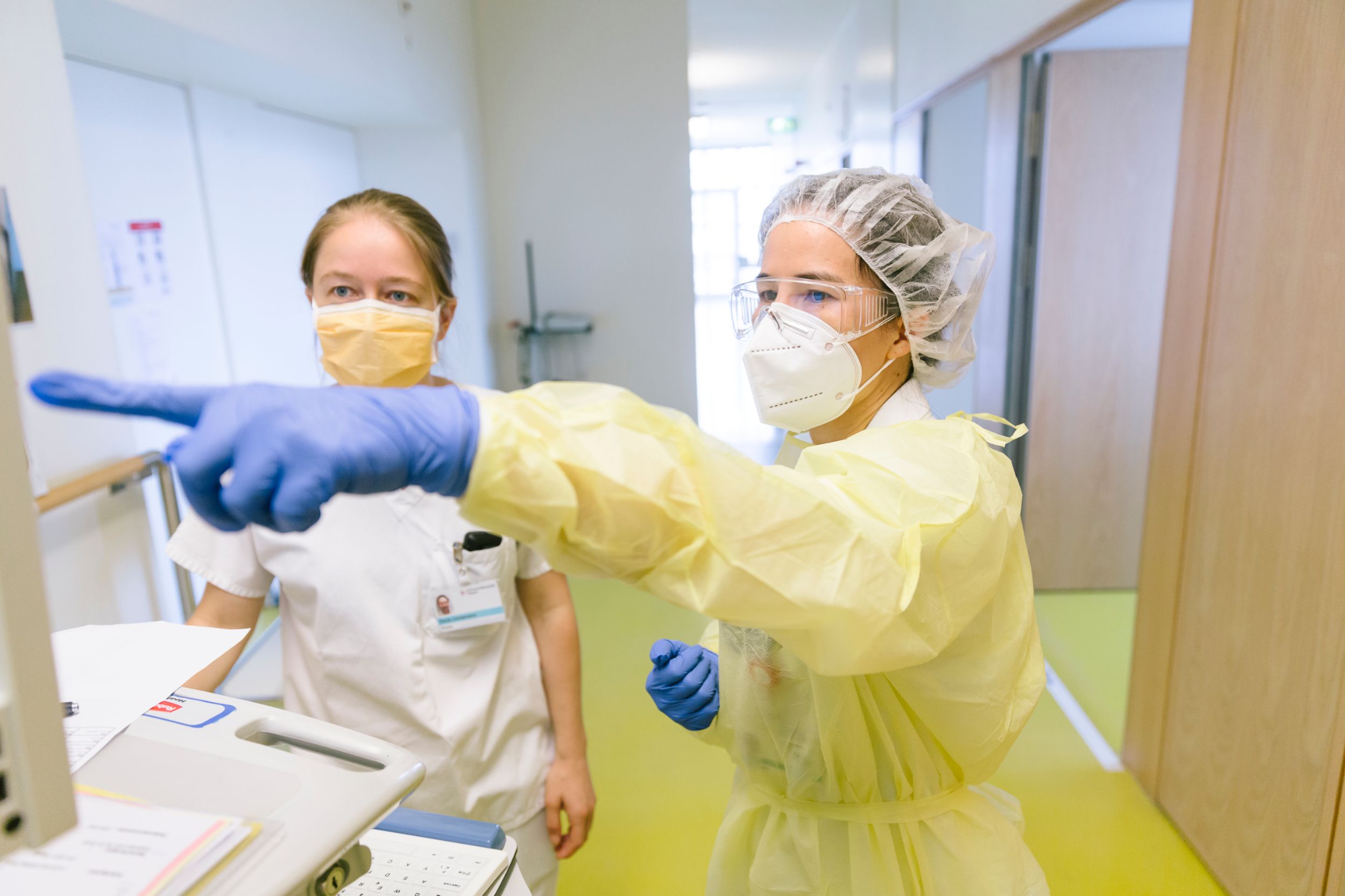
Information on the coronavirus
The following infection prevention measures are in place at the University Hospital Basel with immediate effect:
Dear patient
Due to the current situation regarding COVID-19/SARS-CoV-2, we ask for your understanding for some additional measures during your next visits to the University Hospital Basel.
Infection with the coronavirus: Please register by telephone
If a doctor has already diagnosed you with an infection with the coronavirus (SARS-CoV-2), please be sure to notify us by telephone before your visit. Please also be sure to inform us by telephone before your visit if you have any of the following symptoms
- Cough
- sore throat
- shortness of breath
- fever
- Sudden loss of sense of smell or taste
You will find the telephone number of your clinic on the admission list. Report such symptoms again when you enter the hospital, both at the Infopoint and in the clinic.
If you have any questions, please call your clinic (telephone number on the order form).
The test center at the University Hospital Basel (USB) was closed on 31 January 2023. You can find other test centers here on the website of the Basel-Stadt Department of Health.
Questions and answers about coronavirus
What are the typical symptoms of a corona infection?
- Cough, cold, sore throat
- Fever or feverish feeling, shivering
- Loss of sense of smell and/or taste
- Deterioration in general condition, if not otherwise explained
I am corona-positive - what next?
If your test result is positive, you can access the behavioral instructions on the FOPH website(www.bag.admin.ch/neues-coronavirus) or via QR code.
I am corona-positive and I feel worse?
If you feel worse, please contact your family doctor or the medical emergency center by phone (+41 61 261 15 15) or go to the emergency center of the University Hospital Basel. Always wear a mask when you leave the house.
I had contact with a corona-positive person. What should I do?
relevant contact exists if the
- distance was less than 1.5 meters and
- lasted longer than 15 minutes and
- no mask was worn
A person is contagious at the earliest 48 hours before the onset of the first symptoms. If contact with the person concerned took place before this time, the risk of infection is negligible.
How long does it take between infection and illness?
It takes around three to seven days (in exceptional cases up to ten days) after infection for the first symptoms to appear.
When am I contagious?
People who have been infected can be contagious themselves 48 hours before the onset of the first symptoms.
Questions and answers for cardiology patients
I suffer from high blood pressure. Do I now have an increased risk of developing a serious COVID-19 disease?
High blood pressure and cardiovascular diseases are common. They are particularly common in old age and it is mainly older people who are at risk of COVID-19 disease. This is reflected in the fact that cardiovascular diseases are more common in seriously ill COVID-19 patients. Regardless of age, it is important that your high blood pressure is controlled as optimally as possible. This reduces both the cardiovascular risk and the overall risk in the event of a coronavirus infection or COVID-19 disease.
I take medication in the ACE inhibitor or angiotensin receptor blocker (sartans) class. Do I need to worry about getting COVID-19 sooner or more severely as a result?
No. There is no data that shows a direct link between these drugs and the severity of COVID-19 disease. However, it is very well documented that these drugs significantly reduce mortality from cardiovascular diseases. These include, in particular, heart failure, a heart attack or high blood pressure. The better your heart disease or high blood pressure is controlled, the lower your overall risk. It is therefore essential that you continue to take your medication as prescribed by your doctor.
I had a heart attack, but I feel fine. Do I now have to count myself in the risk group?
In principle, yes. However, the risk depends heavily on the extent of your heart disease and, above all, on your age; the better your cardiac performance and the better your medication for your heart disease, the lower the risk. The risk is not significantly increased if you are physically fit, your heart is pumping normally and your blood pressure is well controlled with medication.
I have read that certain heart medications could be problematic in connection with corona and COVID-19. Is this true and should I stop or change my medication?
Under no circumstances should you stop taking medication, change the dose or switch to other medication on your own initiative. There is currently no evidence to support a link between heart medication and COVID-19. On the contrary: the overall risk is higher in the presence of poorly treated heart disease or inadequately controlled high blood pressure.
I work from home and therefore have much less physical activity. In addition, my cardio sports group is closed at the moment. How can I maintain my physical fitness and morale in this situation?
Walking, cycling or jogging outdoors are still possible without any problems, provided you are out and about alone and avoid crowds. To help you stay fit at home, our KARAMBA rehabilitation program has developed a varied home training program with fitness, strength and coordination exercises for different training levels. This can be accessed at www.karamba-reha.ch.
What applies to all people, whether healthy or ill?
In any case, strictly follow the current recommendations of the Federal Council, which could be tightened further if necessary: Reduce your social contacts and keep two meters distance from the person you are talking to, avoid crowds and wash your hands regularly and thoroughly. If you are unsure, please contact your doctor.
